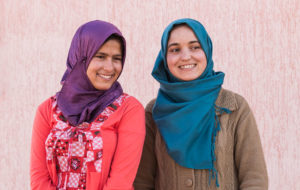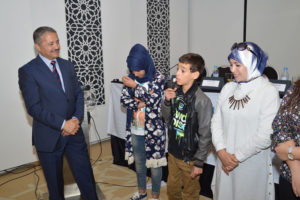
Cuando Laila fue 15 años, Tuvo que dejar la escuela para ayudar a apoyar a su familia vendiendo productos pequeños en las calles de Marrakech. Fue un trabajo agotador y ella vivió con miedo a la violencia o la asalto..
Afortunadamente, ella es De vuelta en la escuela y vivir en una casa segura gracias al apoyo del Proyecto Caminos de Promesa, que tenía como objetivo reducir el trabajo infantil en el área de Marruecos de Marrakech-Tensift-Al Hauz de Marruecos.
La historia de lucha de Laila y su viaje de la vulnerabilidad a la esperanza es una que miles de niños, Los jóvenes y las familias en la región también comparten. En sus cuatro años, El proyecto proporcionó servicios a más de 3,000 edades de los niños 6 a 14 y más 1,300 edades juveniles 15 a 17, ayudándoles encontrar oportunidades para la educación y el empleo seguro y ayudar a sus familias a recuperar la estabilidad.
Financiado por el A NOSOTROS. Departamento de Trabajo e implementado por Creative Associates International, el proyecto también proporcionó alternativas de empleo seguras y productivas para jóvenes de edad laboral legal, A través del entrenamiento vocacional y asistencia de referencia que vincula a los solicitantes de empleo con una red de proveedores de servicios.
Para entonces, El proyecto proporcionó el apoyo que necesitaba para acceder a la oportunidad y encontrar un futuro más brillante.
“Me siento fuerte y capaz de asumir este cambio positivo para el bien de mi familia.,"Dice allí. "La vida de nuestra familia ha cambiado y nuestras esperanzas renacen".
Asociaciones para apoyar a los más vulnerables
Marruecos tiene una de las tasas de trabajo infantil más altas en el Medio Oriente y el norte de África—Scite la ley marroquí que prohíbe a los niños bajo 15 de participar en la actividad económica.
Asociarse para combatir este desafío, Creativo, Estados Unidos. Departamento de Trabajo, el gobierno marroquí y más que 30 Las organizaciones de la sociedad civil colaboraron estrechamente para implementar el Proyecto Caminos de Promesa.
Esta colaboración fue clave para el éxito del proyecto., dice Earl Gast, Vicepresidente senior y Director Senior de Educación para el Desarrollo en Creative.

“El proyecto Marruecos Promise Pathways ha fomentado asociaciones estratégicas con más 30 Organizaciones de la sociedad civil como proveedores de servicios para jóvenes y hogares en la región de Marrakech," dice Gast. "Esta fuerte colaboración fortaleció los sistemas en Marruecos para proporcionar servicios a niños vulnerables y sus familias más allá de la vida del proyecto".
Reuniendo una amplia gama de actores, incluidos los jóvenes, padres, escuelas, comunidades y el gobierno, El proyecto del proyecto de vías de promesa Enfoque envolvente para el servicio modelo de entrega: incluidos los servicios familiares, servicios de salud, Acceso a microcrédito y más: ha ayudado a crear una red de apoyo que aumente la resistencia de las familias y las comunidades y reduzca algunos de los factores de trabajo infantil.
Ha conectado a niños y jóvenes que eran vulnerables al trabajo infantil a las oportunidades educativas y de aprendizaje de calidad..
Con todos estos servicios centrados en jóvenes y familias específicos, El proyecto aumentó sus posibilidades de abordar sus necesidades de manera integral, Dice Najat Sarhani, Jefe de Partido para el Proyecto de Patinas de Promisos, en un 2015 Entrevista que discute el enfoque estratégico del proyecto.
"Es importante que movilizaramos una variedad de socios y esos socios trabajaron juntos de una manera muy coordinada para proporcionar servicios coordinados mientras se concentra en un beneficiario," ella dice.
Una reunión de estos socios en Rabat en un mayo 16 Evento llamado "Transiciones prometedoras: Una celebración del progreso realizado y las transiciones por venir,"El proyecto hizo la transición oficialmente al Ministerio de Educación y Capacitación Vocacional Moroccana, un líder y defensor del proyecto desde el principio, junto con otros socios gubernamentales y de la sociedad civil que se han comprometido a continuar su trabajo con los beneficiarios
Hablando en el evento, Secretario General del Ministerio de Trabajo, Boutata Mohamed, dice que los resultados del proyecto ofrecen muchas lecciones aprendidas y valiosas ideas para otras regiones del país..
«El proyecto también fue útil a nivel de la metodología., que podemos generalizar en otras regiones de Marruecos. Este es uno de los principales resultados de los que estamos orgullosos, ya que garantiza la sostenibilidad del proyecto,» dice Mahoma.
El financiamiento para este proyecto fue proporcionado por el Departamento de Trabajo de los Estados Unidos.. Este material no refleja necesariamente las opiniones o políticas del Departamento de Trabajo de los Estados Unidos., ni la mención de nombres comerciales, productos comerciales, u organizaciones implican el respaldo del gobierno de los Estados Unidos..

